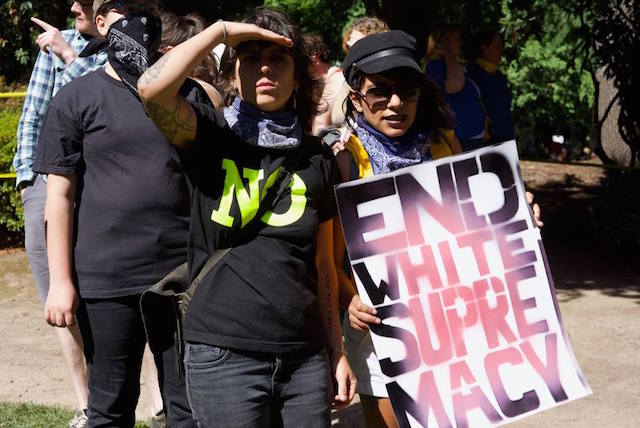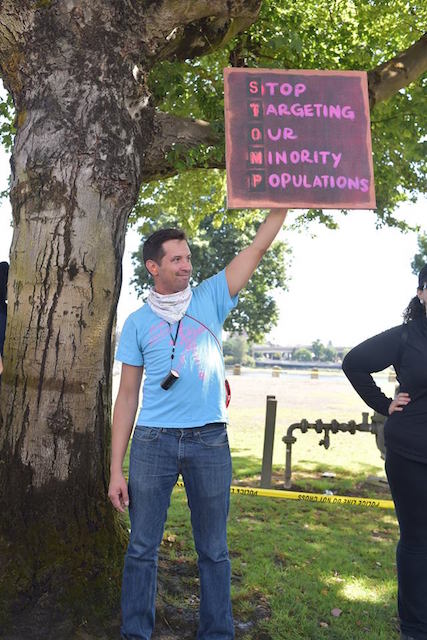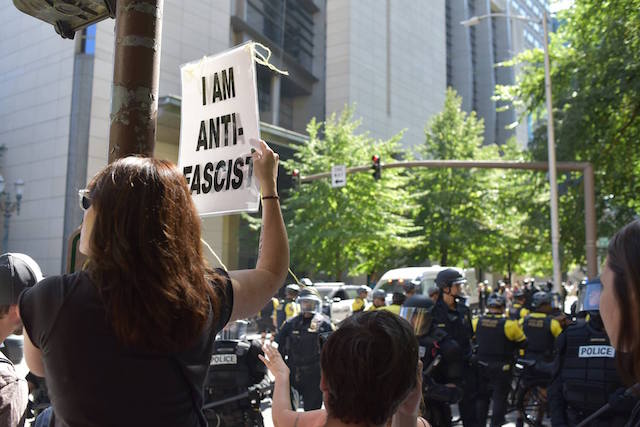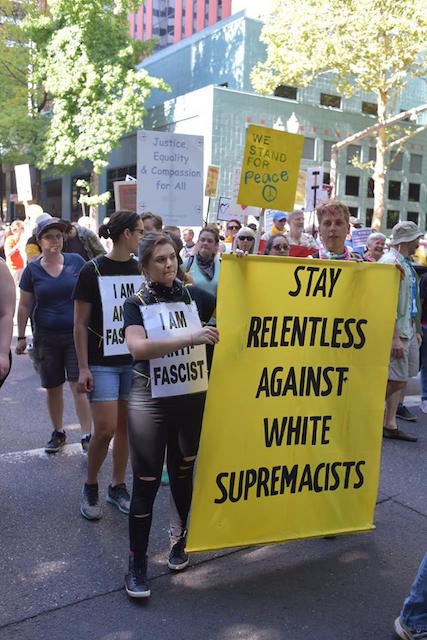
Photo by Bette Lee
Interview conducted by Pete Shaw
PS: I remember when Teressa Raiford was on trial, and the day before the actual jury trial happened and one of the arresting police officers was caught flat-out lying, and of course it was Teressa’s lawyer’s fault for doing that to her, for exposing her, for tricking her into lying. I think that is what people in authority like to call personal responsibility. If we could get to the point in my lifetime where people recognize the fact the reality that cops lie, and that this must always be considered, it would be a huge step.
KB: Yeah. Well that’s a difference between here and Chile. People know the cops exist to protect the powerful, the state and its economic interests. You don’t have to convince people of that. You don’t have to have a discussion about that. Most people already know that.
PS: The recent history of Chile lends itself to that…
KB: The history of this country lends itself to that too! It’s just that privileged white people benefit so much from it that so much has been done to erase that reality.
PS: And we haven’t gone to the other point that the Chileans did which was to say, okay, that’s enough, this is bullshit, and exert themselves.
What do you take from this experience?
KB: It reaffirms my belief that the system is inhumane. We’re living in a system that is structured so as to repress those who fight against it. It validates what I already suspected on a deeper level. How powerful the state’s mechanisms of humiliation and fear and repression are. t’s intense, massive scale gaslighting. Most people are in situations where any criminal charge will make their lives much harder.
PS: The rest of their lives.
KB: Yeah…I’m glad that I didn’t take their last plea offer. I really appreciate my lawyer for supporting me in that decision. The power that the state has is incredible and it is hard not to be cave in to the fear and manipulation they try to use against you. I had already made the decision I was going to trial in August, and then at the last minute they’re trying to make another offer so that they can guarantee that I get at least a slap on the wrist. But it’s not a deal for me. It’s a deal for them.
PS: Right.

Photo by Pete Shaw
KB: That’s the thing. They’re not offering me anything. It’s them making it easier for themselves. But they present it to you as though you would be stupid not to take their deal, because who would risk getting convicted of four charges when you could just get one charge turned into a violation and be done with it? But really, I thought “No. I don’t deserve any punishment. Fuck you guys…still.”
It’s very rewarding to have made the “stupid” decision and still come out on top.
PS: Well, here we are now, 9 months after that white supremacist rally in Terry Schrunk Plaza on June 4, 2017. What do you see when you look at the landscape now? That was some heady and heavy stuff going on. They had a pretty reasonable gathering there for people who were quite willing to be publicly identified as white supremacists, Nazis, and other such ilk. There were a few more confrontations following that. I was down at the waterfront in September when those bastards held their rally. Maybe twenty of them, the rest, I guess, too scared to come to Portland. The ones at the waterfront desperately needed police allies, they were so outnumbered. They fled like rats while the police fired rubber bullets at the protesters on the northern side of the pen they had set up. The cops literally had to run up the street two or three blocks to protect them–they were spending all their time and resources shooting rubber bullets at Antifa. I guess they ran to Vancouver, or at least many might have–there was another rally there with…who is that guy they follow? Joey…Joey Gibson.
It totally fucked my day. As a kid, I watched, and played, a lot of sports. Now, all I really care about, from a fan perspective, is tennis. It’s a beautiful and intense sport, a deft and strangely brutal form of art–just the players and their skill, will, and cleverness. So these folks hold their rally on the day of the men’s final at the US Open. I got back just in time to see Rafael Nadal–pause to venerate–win the last two points to take the match. I was irate.
Anyway, now you’re seeing these articles about overt white supremacist Richard Spencer saying Antifa has been successful in diminishing the crowds at, and shutting down, his and other white supremacists’ rallies, making them less fun–he actually decried the lack of fun at his rallies due to Antifa…
KB: Yeah.
PS: Part of me says we’re missing a point because the police are still an issue.
KB: Yeah. The police are all still there.
PS: And they’re the bigger issue…
KB: Oh, yeah. I think another thing that I’ve also learned…It’s just validated a lot of things I already suspected.
PS: Which are?
KB: Well, just, whatever–you know: this shit is rotten.
But like the media is so complicit. We held a press conference outside of the courthouse after we rejected the offer. And the headline in the Oregonian read, “Anti-fascist Protesters Vow to Fight in the Streets.” Are you kidding me? That was the day before there was supposed to be another big rally. That’s irresponsible and puts people at risk because you create this situation that doesn’t actually exist, but you tell everyone who’s not participating, like these weird white supremacists in Salem who are like, “Oh, they’re gonna fight in the streets? Well…let’s go get our hats and flags and head over there.”
There’s just all the layers of the system working together. So I don’t know. I think you’re right that the whole conversation is beside the point. It’s not about Joey Gibson. It’s about him having a platform and the police protecting him. Nobody cares about him really. It’s the fact that he has police protection and that he’s painted by the media as some kind of an activist.

Photo by Pete Shaw
PS: There’s that old idea about media that because we live in a society with a relative amount of freedom, you can’t just go around throwing people–white people–in jail just because the ruler wants to. So in a society with our amount of freedom–our type of freedom–a media that functions as a propaganda machine of those who own it will develop, and instead of bludgeoning you to think properly, it creates these small parameters of respectable and proper thought. You go left of the New York Times, and you are insane. It seems far more effective.
KB: I lived in Germany for a year, in the former East Germany. I was 16, and that’s when I learned that everything I was ever taught was a lie. There’s this country here, Germany in this case, that doesn’t really affect my life in the U.S. much. So, why does the US education system bother to tell me there were two Germanys: the good one and the bad one, and then the good one won, and now it’s all better. Which is a history that never really happened. In reality, there was a capitalist and a socialist Germany that were reunited in 1990, but there are still many people in the former East Germany that don’t agree with the way reunification took place. While East Germans were demanding political changes, that didn’t necessarily mean that they wanted to transform their economic system as well. Reunification ended up looking more like the dismantling of East Germany rather than a reunion of two equal parts.
So I thought, why did they bother to invent that narrative to teach me in high school? And if they lied about that, holy shit, then they’ve lied about everything! But somehow we believe that there’s this objective truth that exists and we have it? And we have it in our textbooks?
When I was over there I was exposed to a lot of media from the former East Germany. There were women’s magazines that talked about the United States, and when they talked about the United States, they prefaced it with “the imperialist power of the world,” continue sentence. And I was like, Holy shit! This is what they call propaganda?”
PS: It seemed like for a short period there, maybe three or four years, after we invaded Iraq, we were kind of using, with pride, words like empire and imperial…
KB: That’s when I realized–wow!–there’s something more powerful…Because if somebody is telling you how things are in a very overt way, you can read between the lines. But if we change the conversation and talk about nothing that matters at all? That’s brilliant. That’s the best propaganda there is. Like self-hate. Creating a country of people who are totally insecure and can’t see past their own face because they hate themselves and everything around them and have no idea why.

Photo by Pete Shaw
PS: Rugged individualism has a very nasty flip side.
KB: So if we just talk about beauty products and celebrities, then that’s the best propaganda there is. Because that’s how you end up with this guy who wears a USA hat, who has no idea–what does that mean?
PS: Go shopping.
KB: Go shopping, yeah. He had to get a new hat. It was stolen.
PS: What do you think people should do to get involved? They see this stuff, and they’re confused. They want to do something, but they don’t know where to go.
KB: I think decolonizing is what needs to happen because we’ve internalized all these layers of oppression and are reproducing oppressive behaviors ourselves. It means both engaging with your surroundings–I was gonna say community, but who really even has community in this country? I think community is a basic human need we have mostly destroyed here.
PS: There was that recent study that basically showed men are lonely. I would think it has a lot to do with that constant onslaught of propaganda about the imperative of being a rugged individual, a real man.
KB: I think the United States is the loneliest place on the earth. I don’t know why people are so into it.
PS: There is something about that rugged individualism that is seductive, particularly when presented by Hollywood, the superhero films, the cowboy films. I get it, why people buy in. We saw a documentary 15 or so years ago about five or six groups of folks who had fled Cuba for the US. I think four of them were enticed by the possibility of buying so much stuff, and if I remember right, they all hated it here. It was horrible. It was a tough dollar. But for the other two, who came over here to be with their families, it was great because they had their families again. They had the community they had lost.
Our sense of community here is horrible. You have to work hard to get it.
KB: The first time I went to Chile was in 2009, but I was really living down there from 2013-2016. A lot of times I feel like I have more community there than I do here, and I’ve lived here most of my life. It’s disturbing. It’s really disturbing. I think a big part of that is that most people have no connection to the land here. So people move a lot. The way we have become so disconnected from the land allows for a more transient lifestyle and less community as a result of that.
I think we need to start to dismantle the systems inside of us, and simultaneously do that with our surroundings.
People say get organized, join groups, etcetera, but I think the underlying issue is community. And your community doesn’t have to be an organization with meetings. It can be the people you live with, to be consciously working on decolonizing together. That was the experience I had in Chile working with the Mapuche people. It’s not like we get together for meetings once a week, and that’s how we’re gonna have a revolution. We all already live together, go to school together, have the desire to decolonize together, so we’ll just be doing that when we’re meeting, when we’re hanging out, when we’re partying, when we’re at school. All the time.
PS: It’s a way of life.
KB: Yeah. That’s what I want everyone to do: decolonize. I think we have to heal ourselves, reconnect with our elders and the land and build strong communities in order to reimagine what our future could look like without capitalism. If I hadn’t been assigned an awesome public defender and if I did had not had community support, it would have been much harder to stand up for what I believed was right. I want to thank the National Lawyers Guild, Portland ABC, and the Portland General Defense Committee especially for their work in supporting those of us who decided to go to trial despite the pressure from the state to just take the deal and move on. Solidarity is definitely our most important weapon in this fight.







1 comment for ““I think decolonizing is what needs to happen because we’ve internalized all these layers of oppression and are reproducing oppressive behaviors ourselves. I think we need to start to dismantle the systems inside of us, and simultaneously do that with our surroundings.” An Interview with Kelly Baur, Part 2”